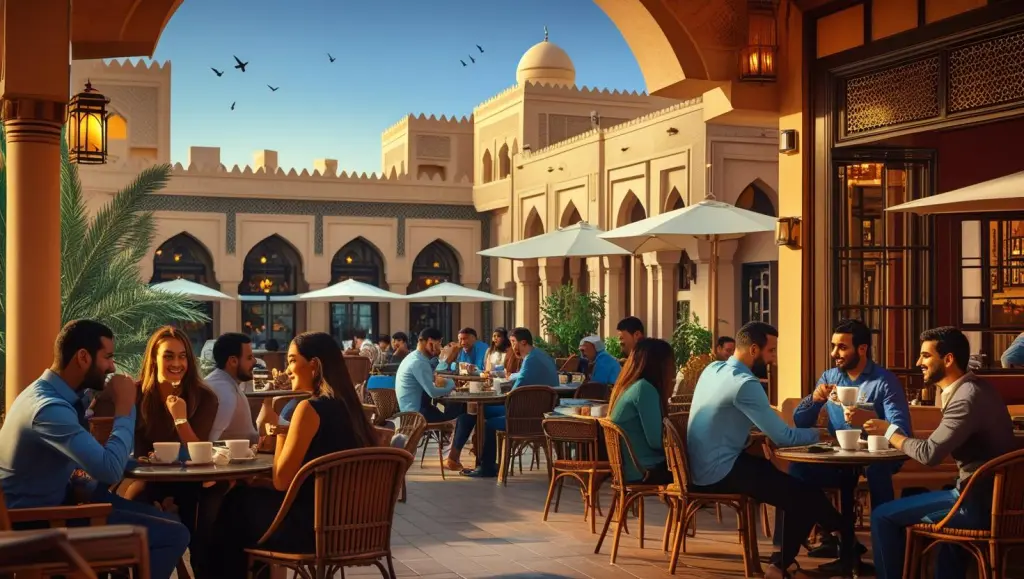The Heartbeat of Kuwaiti Hospitality
In Kuwait, a country steeped in rich heritage and deep-rooted traditions, coffee and tea are far more than just beverages they are a reflection of identity, generosity, and cultural pride. The Kuwaiti people have turned the art of serving coffee and tea into an expression of warmth, respect, and unity. Every sip shared between families, friends, or even strangers tells a story that dates back centuries, shaping social bonds and reinforcing a sense of belonging.
The tradition of offering these beverages is considered a gesture of goodwill and honor. In Kuwaiti homes, guests are always welcomed with Arabic coffee or tea, served with dates or sweets, symbolizing friendship and hospitality. To refuse a cup can even be perceived as impolite, highlighting how deeply these customs are woven into the social fabric of the nation.
The Historical Roots of Kuwaiti Coffee Culture
Arabic coffee, locally known as “Gahwa,” has played a central role in Kuwaiti life since ancient times. Its story begins with the Bedouins, who viewed coffee as a source of energy and companionship in the desert. The drink soon evolved from a survival necessity into a ritual that represented respect and status.
Traditionally, the preparation of coffee was an event in itself. The beans usually lightly roasted are ground with cardamom and brewed in a dallah, the iconic long-spouted coffee pot. The aroma fills the room long before the first cup is poured, creating a sensory invitation that embodies the Kuwaiti spirit of welcome.
The act of serving Gahwa follows a specific etiquette. It is always poured by the host into small cups called finjans, starting from the right-hand side of the guest circle. The person serving must stand, holding the dallah in the left hand and the cup in the right, a gesture of honor and attentiveness. Each guest typically drinks three small cups no more, no less signifying completeness and balance.
Tea: A Symbol of Warmth and Everyday Life
While coffee represents ceremony and tradition, tea is the comforting heartbeat of daily Kuwaiti life. Unlike the formal setting of Gahwa, tea is shared in every moment] after meals, during family conversations, or while watching the sun set over the Arabian Gulf. It embodies a sense of ease and familiarity that brings people together effortlessly.
Kuwaiti tea is often brewed strong and dark, sometimes flavored with aromatic herbs such as saffron, mint, or cardamom. Each household has its own unique recipe, passed down through generations, reflecting family identity and personal taste. The process of making tea is not hurried it is done with care, patience, and intention, just as life itself is valued in Kuwaiti culture.
In cafés and homes alike, tea acts as a bridge between generations. Elders share stories of the past while the younger generation listens, cups in hand, learning not only about tradition but about the meaning of connection. In many ways, tea in Kuwait is not just a drink] it is a companion to reflection and memory.

Coffee and Tea as Symbols of Status and Respect
In traditional Kuwaiti gatherings, coffee and tea play important roles in social hierarchy and etiquette. The type of beverage offered, the order in which it is served, and the way it is presented all reflect the level of respect toward the guest. Serving Gahwa before tea, for instance, signals formality and honor, while offering tea afterwards invites casual conversation and relaxation.
In weddings, festivals, and official gatherings, coffee and tea remain an unspoken yet powerful form of communication. They convey sincerity, humility, and goodwill values that lie at the core of Kuwaiti society.
The Modern Evolution of Tradition
As Kuwait continues to modernize, its coffee and tea culture has adapted while preserving its traditional essence. The rise of global café chains and specialty coffee shops has influenced local tastes, yet Kuwaiti people continue to hold their roots close. Young entrepreneurs are now opening modern coffee houses that blend Western aesthetics with traditional Arabic touches, creating spaces where the old meets the new.
These modern cafés often serve both Gahwa and espresso, allowing customers to experience the best of both worlds. Some even host workshops on traditional coffee-making techniques, ensuring that new generations understand the historical and cultural importance of these practices.
Similarly, tea culture in Kuwait has embraced modern flavors and international styles while maintaining its heritage. Specialty teas, bubble teas, and herbal blends have found their place in the Kuwaiti market, but they coexist harmoniously with the timeless saffron and mint-infused brews that have been loved for centuries.
The Role of Coffee and Tea in Social Gatherings
No Kuwaiti gathering feels complete without the familiar sight of steaming cups being passed around. Whether it’s a family reunion, a business meeting, or a religious celebration, coffee and tea play a unifying role. They provide a shared experience that encourages conversation, storytelling, and mutual respect.
In the traditional Diwaniya a social gathering space primarily for men serving coffee and tea is a crucial ritual. The Diwaniya is where politics, business, and community issues are discussed, often beginning with the host offering Gahwa to his guests. This act sets the tone for open dialogue and trust, reinforcing the values of brotherhood and community spirit.
For women, tea gatherings often carry the same significance. It’s a time to share emotions, celebrate milestones, and strengthen relationships. The preparation and presentation of tea are treated as acts of love, symbolizing both care and artistry.
Coffee and Tea in Festivals and Special Occasions
During Kuwait’s major celebrations, such as National Day or religious festivals like Eid, coffee and tea take on even greater importance. They become part of the communal joy served continuously as people visit each other’s homes, exchange greetings, and celebrate unity.
In weddings, serving Gahwa is an essential part of the ceremony. It represents the merging of two families, respect for guests, and blessings for the couple’s future. Tea follows, signifying sweetness, comfort, and peace values hoped for in every marriage.
Even during solemn moments, such as mourning gatherings, coffee and tea are served as symbols of respect and remembrance. They help sustain guests and provide a comforting presence, reminding everyone that life, like the aroma of freshly brewed Gahwa, lingers in memory even after it fades.
The Sensory Language of Kuwaiti Beverages
To truly understand Kuwaiti coffee and tea culture, one must go beyond taste. It’s about the sounds of beans grinding in a brass mortar, the smell of cardamom rising in the air, and the rhythmic clinking of cups being filled. Every sense participates in the ritual, creating a symphony of warmth and connection.
Even the presentation matters the shine of the dallah, the elegance of the tray, and the soft golden color of the liquid. Each detail speaks of intention and care, revealing how beauty is intertwined with daily life in Kuwait.
Through these sensory experiences, coffee and tea transcend their roles as beverages] they become language. A silent exchange of emotion, gratitude, and heritage that words alone cannot capture.

Women’s Role in Preserving Coffee and Tea Traditions
Throughout Kuwait’s history, women have played a vital part in maintaining and passing down the traditions of coffee and tea preparation. Within every household, mothers and grandmothers have taught their children the values behind serving these drinks properly patience, generosity, and mindfulness.
In modern Kuwait, women continue to innovate while honoring their roots. Many have become entrepreneurs, opening boutique cafés or launching tea brands inspired by traditional recipes. Their efforts not only preserve cultural identity but also empower the next generation to take pride in Kuwaiti craftsmanship and flavor.
Through these evolving roles, women have ensured that the nation’s coffee and tea heritage remains alive, cherished, and ever-growing.
The Art of Balance: Modern Life Meets Ancient Tradition
Today’s Kuwait stands at the intersection of progress and heritage. Amid skyscrapers and modern malls, the ritual of serving coffee and tea remains a grounding force a daily reminder of who the Kuwaiti people are and where they come from.
In a world that moves quickly, taking time to brew Gahwa or steep tea represents something powerful: the choice to slow down, to connect, and to value the human moments that technology can never replace. This balance between modern efficiency and timeless grace defines Kuwait’s evolving identity.
Even among the youth, these traditions remain respected. Many young Kuwaitis proudly showcase Gahwa ceremonies on social media, blending heritage with digital storytelling. In this way, the cultural role of coffee and tea continues to thrive, bridging the past and the future.
Beyond Borders: Kuwaiti Beverages on the Global Stage
As Kuwait’s culinary culture gains international attention, its coffee and tea traditions are reaching global audiences. Travelers visiting Kuwait often find themselves captivated by the hospitality expressed through every cup. Likewise, Kuwaiti expatriates bring their love for Gahwa and tea to other countries, introducing people worldwide to the warmth of their customs.
Some Kuwaiti brands are even exporting their blends abroad, showcasing local flavors infused with cardamom, cloves, or rose petals. This international appreciation has turned what was once a regional tradition into a global symbol of Kuwaiti pride and cultural richness.
By sharing these customs with the world, Kuwait demonstrates that hospitality, respect, and human connection are universal values] no matter where you come from.
Conclusion: A Tradition That Brews the Spirit of Kuwait
Coffee and tea in Kuwait are not just drinks they are the lifeblood of its culture, connecting the old with the new, the personal with the communal. They represent everything Kuwaiti society holds dear: respect, warmth, patience, and togetherness.
In every dallah poured and every cup offered lies a story a testament to the enduring power of hospitality and the beauty of shared moments. As Kuwait continues to evolve, its love for these timeless beverages will remain an anchor, reminding its people that true richness lies not in luxury, but in tradition, generosity, and the comforting aroma of freshly brewed Gahwa and tea.
Do follow Gulf Magazine on Instagram.
Also Read – The Unbreakable Bond: Family Values Shaping Kuwaiti Society



